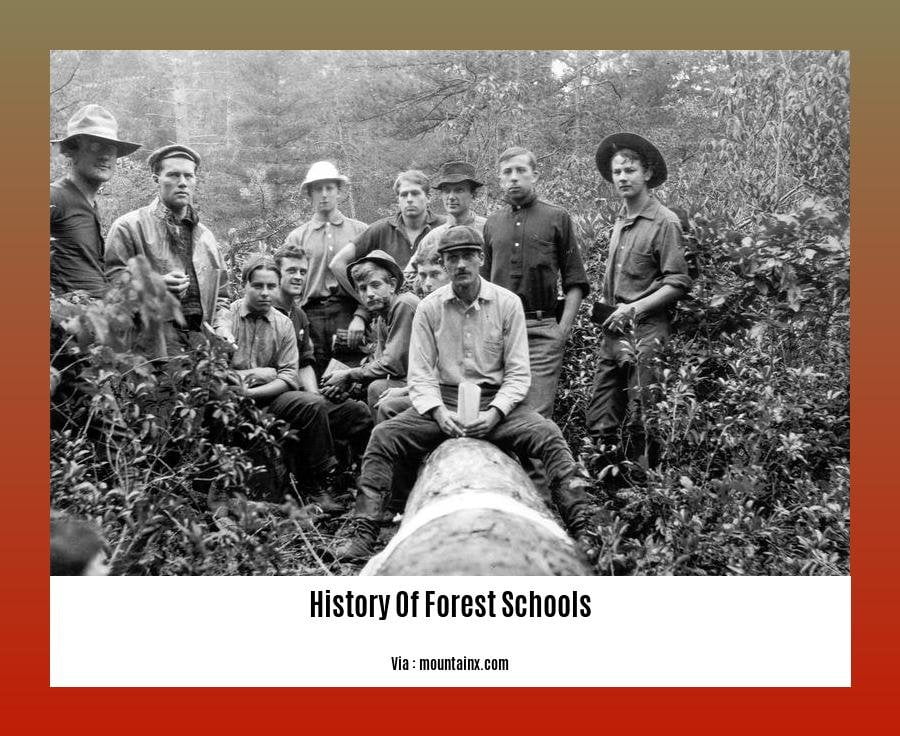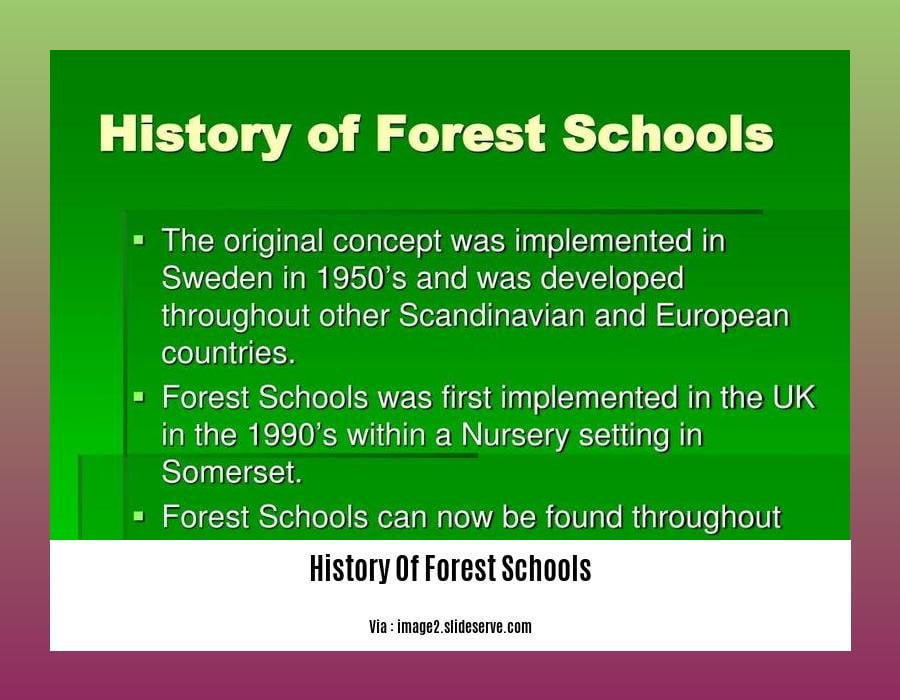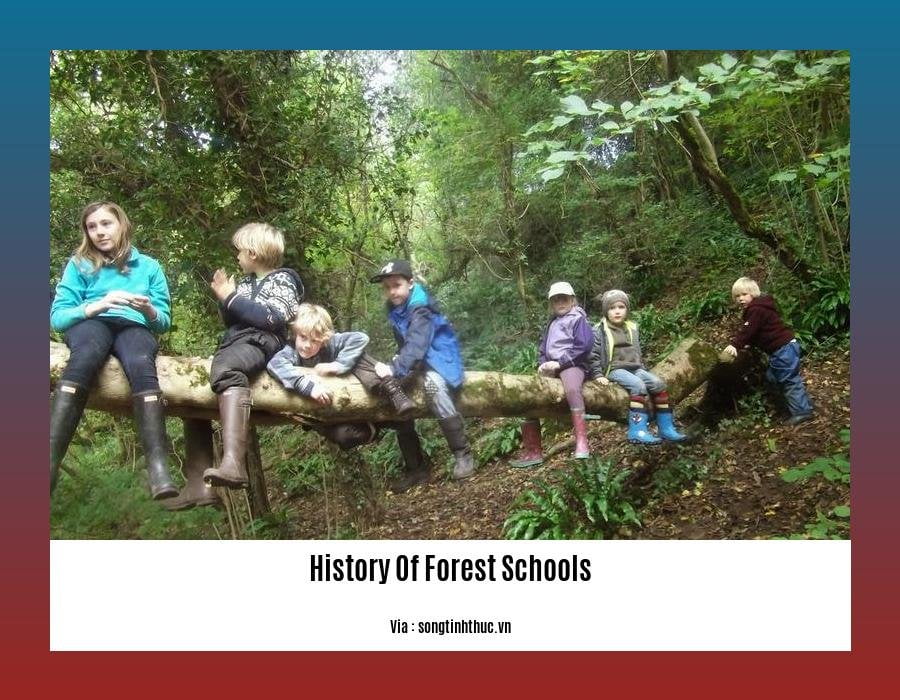Embark on a journey through the annals of history as we explore the captivating narrative of forest schools, The title [A History of Forest Schools: The Pioneering Movement in Nature-Based Education] invites us to delve into the origins of this transformative educational movement rooted in the profound connection between nature and learning.
Key Takeaways:
- Forest School is an educational approach that emphasizes outdoor learning and fostering a connection with nature.
- The concept originated in Scandinavia, influenced by the philosophy of friluftsliv, which means “open air living.”
- The first forest school was established by Ella Flautau in Denmark in the early 1950s primarily as an informal daycare.
- From Scandinavia, the concept extended to other nations, including the UK, where it gained popularity in the 1990s.
History of Forest Schools

Delve into the fascinating history of forest schools, a unique and transformative educational approach that emphasizes outdoor learning and nature connection. Join us as we explore the journey of this pioneering movement.
Origins in Scandinavia
The roots of forest schools can be traced back to the Scandinavian countries, particularly influenced by the philosophy of friluftsliv, which translates to “open-air living.” This concept highlights the importance of spending time outdoors and connecting with nature for overall well-being.
The Pioneering Efforts of Ella Flautau
In the early 1950s, the first forest school was established in Denmark by Ella Flautau, a visionary educator and naturalist. Driven by her passion for nature and child development, she created an informal daycare center in the woods where children could freely explore and learn through hands-on experiences.
Expansion Across Scandinavia and Beyond
The success of Flautau’s forest school model sparked interest throughout Scandinavia, and similar initiatives began to emerge in countries like Sweden and Norway. The emphasis on outdoor play, environmental education, and fostering a deep connection with nature resonated with educators and parents alike.
Arrival in the United Kingdom
In the 1990s, the concept of forest schools gained traction in the United Kingdom, thanks to the tireless efforts of individuals and organizations passionate about outdoor learning. Forest school programs began popping up across the country, offering children unique opportunities to engage with nature and develop essential life skills.
Global Recognition and Impact
Today, the history of forest schools is a testament to the power of nature-based education. Forest schools have spread globally, reaching countries like the United States, Canada, Australia, and New Zealand. They continue to inspire educators and parents who recognize the transformative impact of outdoor learning on children’s development.
Ever wondered how the round leather game was introduced and nurtured in the most populous black nation on earth? Learn about the history of football in Nigeria that made the country a powerhouse in the African continent.
The history of health education in Nigeria is a fascinating journey that spans from the pre-colonial era to the present day, and it’s filled with inspiring stories of resilience, innovation, and the tireless efforts of dedicated individuals and organizations to improve the health and well-being of the Nigerian population.
Explore the history of hockey game and discover how this fast-paced, thrilling sport evolved from its humble beginnings on frozen ponds to become a global phenomenon that captivates audiences with its speed, skill, and excitement.
Expansion Across Europe: Influential Models
Between 1992 and today, the forest landscape in Europe has taken a dramatic turn, increasing by an impressive 10.4%. This significant expansion can be attributed to two primary factors: forest expansion (66%) and forest regeneration (34%).
Forest Expansion:
The Mediterranean and temperate regions have witnessed a surge in forest expansion, driven by afforestation efforts and the conversion of abandoned agricultural lands into flourishing forests.
Forest Regeneration:
In the boreal region, natural regeneration has played a pivotal role, with forests bouncing back after disturbances like fires and logging.
Influential Factors:
Several factors have synergized to drive this remarkable forest expansion across Europe. Let’s explore these key influences:
Climate: Favorable climatic conditions, marked by increased precipitation and reduced drought stress, have created an environment conducive to forest growth.
Land Use Change: The abandonment of agricultural lands and their subsequent conversion to forests, through afforestation or natural succession, has significantly contributed to this expansion.
Socioeconomic Factors: Rural development policies and incentives for forest conservation and expansion, exemplified by the European Union’s Common Agricultural Policy, have provided a strong impetus for forest area increase.
Key Takeaways:
Forest area in Europe has witnessed a substantial 10.4% increase since 1992, driven by both forest expansion and regeneration.
Forest expansion in the Mediterranean and temperate regions is fueled by afforestation and the conversion of abandoned agricultural lands.
Natural regeneration is the primary driver of forest expansion in the boreal region, following disturbances such as fires and logging.
Favorable climatic conditions, land use changes, and socioeconomic factors have collectively influenced this remarkable forest expansion across Europe.
Sources:
[1] Recent forest area increase in Europe: expanding and regenerating forests
[2] Top 10: countries with increasing forest areas
Key Principles and Practices in Forest Schools

Today, let’s dive into the essential principles and practices that form the core of forest schools. These guiding principles have shaped the philosophy and approach of forest schools worldwide, creating a unique and transformative learning environment for children.
1. Nature as a Teacher:
At the heart of forest schools lies the belief that nature is the primary educator. Children are encouraged to explore, interact, and learn from the natural world around them. Forest schools provide an immersive experience where kids can develop a deep connection with nature, fostering a sense of wonder, curiosity, and respect for the environment.
2. Child-Led Learning:
Forest schools embrace a child-centered approach to learning. Children are given the freedom to choose their activities, explore their interests, and set their own pace of learning. Educators act as facilitators, guiding and supporting children’s experiences rather than dictating lessons. This approach fosters independence, creativity, and a love for lifelong learning.
3. Risk-Taking and Resilience:
Forest schools encourage children to take calculated risks within a safe and supportive environment. They are allowed to climb trees, play in the mud, and engage in activities that challenge their physical and emotional boundaries. These experiences help children develop resilience, problem-solving skills, and a sense of accomplishment.
4. Holistic Development:
Forest schools prioritize the holistic development of children. They aim to nurture children’s physical, emotional, social, and cognitive skills. Through hands-on experiences and teamwork, children learn to collaborate, communicate, and build strong relationships with their peers and educators.
5. Sustainability and Environmental Awareness:
Care for the natural world is an integral part of forest schools. Children are taught about the importance of sustainability, conservation, and protecting the environment. They learn to respect and appreciate the delicate balance of ecosystems and develop a lifelong commitment to environmental stewardship.
Key Takeaways:
Nature as a Teacher: Forest schools believe nature is the primary educator, fostering wonder and curiosity about the natural world.
Child-Led Learning: Children are free to choose their activities, explore their interests, and set their own pace of learning.
Risk-Taking and Resilience: Children are encouraged to take calculated risks to build resilience and problem-solving skills.
Holistic Development: Forest schools promote the holistic development of children, nurturing their physical, emotional, social, and cognitive skills.
Sustainability and Environmental Awareness: Children learn about sustainability and conservation, developing a lifelong commitment to environmental stewardship.
Citations:
Global Impact and Contemporary Relevance of Forest Schools
Forest schools have profoundly impacted nature-based education globally, leaving an indelible mark on contemporary pedagogical approaches to early years learning. Originating in Scandinavia, the movement has since spread its roots across continents, inspiring educators and parents alike to embrace the transformative power of outdoor experiences for children.
The Pioneering Spirit of Forest Schools
The seeds of forest schools were sown in the visionary minds of educators like Ella Flautau, who in the 1950s, nestled in Denmark, laid the foundation for this innovative teaching methodology. Flautau’s philosophy centered on fostering children’s connection with nature through hands-on exploration and self-directed learning.
Her model emphasized the significance of nature play, risk-taking, and resilience, becoming a blueprint for forest schools worldwide. This pioneering spirit continues to guide contemporary forest school practices, ensuring that the core principles of experiential learning remain at the heart of this educational movement.
Contemporary Relevance and Enduring Value
In today’s rapidly evolving world, forest schools have become increasingly relevant as a response to the growing need for children to reconnect with the natural world. Research consistently highlights the myriad benefits of forest schools for children’s development.
Benefits of Forest Schools:
- Enhanced social, emotional, cognitive, and physical development
- Boosted creativity and problem-solving skills
- Nurturing of environmental awareness and stewardship
- Fostering of self-confidence and resilience
- Promotion of holistic child development
As educators and parents seek to provide children with a well-rounded education that prepares them for the challenges of the 21st century, forest schools offer a compelling solution. By embracing the power of nature, forest schools empower children to become confident, compassionate, and environmentally conscious global citizens.
Key Takeaways:
- Forest schools have a global reach, inspiring educators and parents worldwide.
- The principles of forest schools emphasize experiential learning, hands-on exploration, and fostering a connection with nature.
- Research supports the benefits of forest schools, including enhanced child development, social skills, and environmental awareness.
- Forest schools are increasingly relevant in today’s world, offering a counterbalance to the digital age and promoting holistic child development.
Citations:
- [Forest School Association](
- [ResearchGate: Forest School](
FAQ
Q1: How did the concept of Forest School originate?
A1: The concept of Forest School originated in Scandinavia in the early 1950s, influenced by the philosophy of friluftsliv, meaning “open air living.”
Q2: Who established the first Forest School?
A2: Ella Flautau, a Danish kindergarten teacher, established the first Forest School in Denmark in the early 1950s as a form of informal daycare.
Q3: How did Forest School spread beyond Scandinavia?
A3: The concept of Forest School spread from Scandinavia to other European countries and eventually to the UK, where it gained popularity in the 1990s.
Q4: What are the key principles of Forest School?
A4: Key principles of Forest School include child-led learning, fostering a sense of wonder and curiosity, and promoting risk-taking and resilience.
Q5: What are the benefits of Forest School for children?
A5: Research suggests that Forest School programs can lead to improved social, emotional, cognitive, and physical development in children.
- Discover Long Black Pepper: Flavor & Health Benefits - April 25, 2025
- Shocking Twists: The Grownup Review: Unreliable Narration - April 25, 2025
- A Quiet Place Book vs Movie: A Deep Dive - April 25, 2025
















